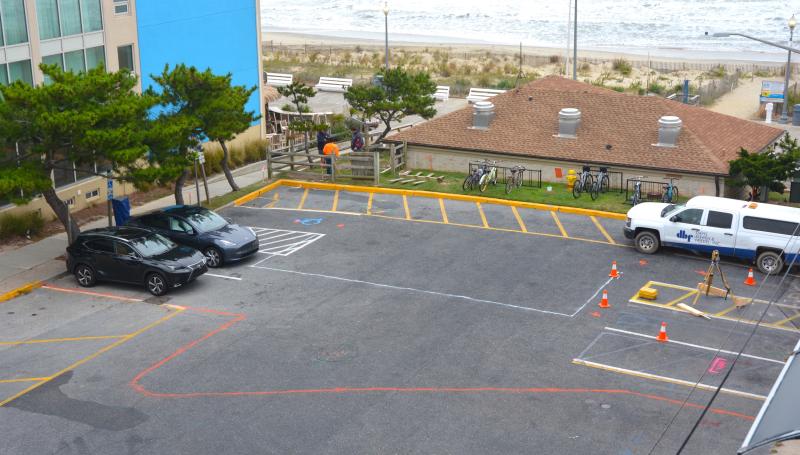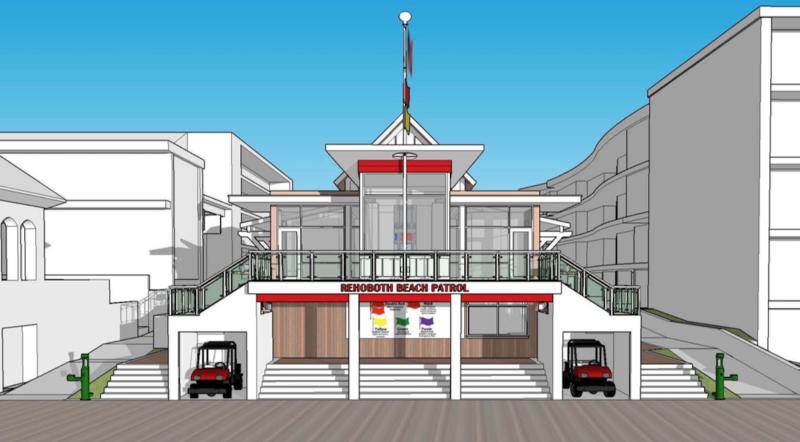Rehoboth planners begrudgingly issue Baltimore Avenue report

Recognizing the ability of city commissioners to move forward after 45 days without their input, the Rehoboth Beach Planning Commission has begrudgingly issued a report on the proposed legal abandonment of a portion of Baltimore Avenue.
For years now, the city has been working toward a new Rehoboth Beach Patrol and comfort station on the Boardwalk end of Baltimore Avenue. The city needs to use about 60 feet at the beach end of the street to accommodate the new structure. City officials had been operating under the assumption that construction was to begin soon after Labor Day, but that didn’t happen because members of the public raised concerns that the city was not following procedures laid out in the city charter and state code that require a public hearing after the planning commission issues a report on the proposed abandonment.
The planning commission was given its marching orders in late September. The planning commission first discussed the project a couple of weeks later, tasking its attorney Luke Mette with crafting a draft response.
With no discussion, the planning commission voted unanimously in favor of the report during a meeting Nov. 3.
In short, the 13-page report emphasizes that the city needs to make sure all property owners on the two blocks of Baltimore Avenue are aware of the project. It also says the city needs to: use larger, more legible drawings of the proposed abandonment; include visible depictions of precise property boundaries; explain why the abandonment is needed for the new structure; and address how the abandonment will impact infrastructure in the immediate area. Lastly, the report suggests that the city consider putting the new building in a specific zoning designation.
All discussion on the report was held during a special meeting Nov. 2, and while none of the planning commissioners were against the project, they weren’t happy with being tasked with the last-minute assignment.
Planning Commissioner Michael Strange said all they’ve done is generate questions. He said the information given to the planning commission was lacking, and the group didn’t have enough data to draw a significant conclusion.
Planning Commissioner Susan Stewart described the report as a non-report because the city hadn’t provided them with the proper tools to complete it. Planning Commissioner Earl Stockdale said this shouldn’t happen again.
City commissioners were expected to discuss the planning commission’s report during a workshop Nov. 6, but that discussion took place after the deadline for the Nov. 7 edition of the Cape Gazette.
Site-plan review report
City commissioners have also asked the planning commission for recommendations on changes to the process related to site-plan review and the subdivision of land.
The request was spurred by the renovation of the former Sandcastle Motel into what is now Coast Rehoboth Beach. In addition to a top-to-bottom renovation, developers were allowed to demolish a significant portion of the building in the middle of summer when the city has a moratorium on demolitions unless for an emergency. At no point during the 18-month renovation did the planning commission or city commissioners get a chance to review plans, because city code didn’t require it.
During the meeting Nov. 2, the majority of the discussion was centered around what kind of projects the planning commission should be spending its time reviewing. The general consensus among the group is that projects like the renovation of Coast should be reviewed, but there was some concern that proposed language would ultimately mean fewer projects would also be included.
Matt Janis, city building inspector, said he understood the desire to review large renovation projects, but he also said the way he read some of the new language would mean other commercial projects would also be included. He gave the examples of a hotel replacing hotel room vanities or a restaurant replacing its floor.
Vince Robertson, a local land-use attorney and property owner in Rehoboth, urged the planning commission to consider unintended consequences. He said he was concerned that if the process was made too onerous, property owners would simply forgo cosmetic renovations, which would be bad for the city.
Planning commissioners agreed with Janis and Robertson.
The planning commission doesn’t want to be seen as venturing into regulatory overreach, said Commissioner Nan Hunter. There are projects the planning commission hasn’t seen before and doesn’t want to see now, she said.
There had been a placeholder on the Nov. 3 meeting to continue discussion on this topic, but the group decided to hold off until its December meeting to allow Mette more time to incorporate the discussion into proposed language.





















































